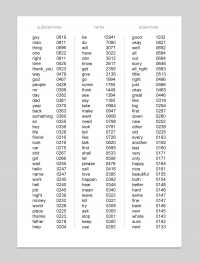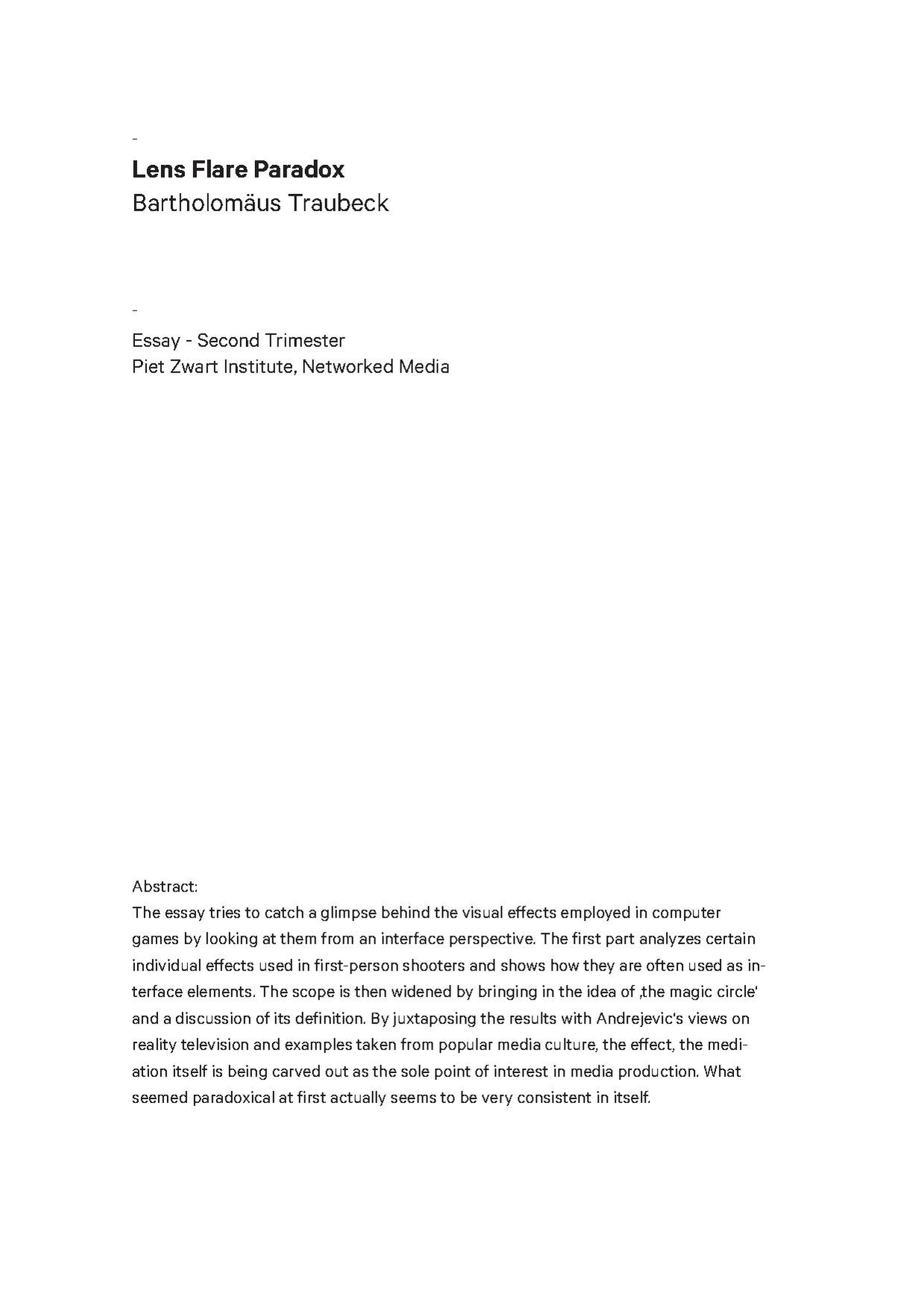Bartholomaeus Traubeck, Trimester 2, 2012: Difference between revisions
(→Photos) |
No edit summary |
||
| (7 intermediate revisions by one other user not shown) | |||
| Line 57: | Line 57: | ||
=== Photos === | === Photos === | ||
[[File:ersions1.png|200px|thumb||Ersions]] | |||
[[File:ersions7.png|200px|thumb||Ersions]] | |||
[[File:ersions3.png|200px|thumb||Ersions]] | |||
[[File: | [[File:Wordanalysis.png|200px|thumb||Guy Be Good]] | ||
=== Video === | === Video === | ||
== Essay == | == Essay == | ||
| Line 151: | Line 119: | ||
== Additional Information == | == Additional Information == | ||
http://ersions.com/ | |||
http://traubeck.com/ersions | |||
[[Category: Trimester Projects]] | [[Category: Trimester Projects]] | ||
[[Category: 2011/2012]] | |||
Latest revision as of 13:50, 24 September 2012
Bartholomäus Traubeck, Trimester 2, 2012.
Guy Be Good / Ersions
Description
'Guy Be Good':
For the Archive & Memory thematic I chose to work with mainstream cinema and how it creates wishes and embeds them into our collective memory. This was partly inspired by Arjun Appadurai's text Archive and Aspiration in which he also talks about the aspirations western cinema (and TV) raises in migrants from poorer, non-western countries.
"Migrants, especially the poorer migrants of this world, are not thriving in a world of free markets, consumer paradise or socìal liberation. They are struggling to make the best of the possibilities that are opened to them in the new relation- ships between migration and mass mediation. There is no doubt that migrants today, as migrants throughout human history, move either to escape horrible lives, to seek better ones, or both. The only new fact in the world of electronic mediation is that the archive of possible lives is now richer and more available to ordinary people than ever before. Thus, there is a greater stock of material from which ordinary people can craft the scripts of possible worlds and imagined selves. This does not mean that the social projects that emerge from these scripts are always liberating or even pleasant. But it is an exercise in what I have recently called ‘the capacity to aspire'." - Arjun Appadurai
Mainstream cinema as part of this archive of possible lives seems like a good starting point, as it usually encompasses the 'great' stories and all their necessary parts like love, identity, morality, ethics, drama etc. Also its language is generally very basic making it easy for any kind of audience to understand.
In order to find an approach to analyse the language and vocabulary of mainstream cinema, I downloaded the English subtitle files of the Top 50 movies of the ‘Top-US-Grossing Feature Films Released In 2011‘ list on IMDB. These subtitle files were then skimmed for word occurence. The results are divided into substantives, verbs and adjectives, the basic building blocks of a sentence.
While the suggestive division in three parts may be not only entertaining but also misleading in some ways, other peculiarities like the fact that the majority of gender-specific words are attributed to the male gender, cannot be overlooked. The final version is supposed to be an installation with the whole results as printed pages nailed to a wall, starting with the first and topmost results in the middle and the rest slowly moving down until the later results turn into a pile of papers on the floor.
Originally I wanted to do a more complex work, including a sentence by sentence analysis and in the end the creation of a prototypical script synthesized automatically from the source subtitle files. This approach was unfortunately not possible to realize due to several reasons. First of all the quality of the subtitle files is very diverse and choosing the best translation can almost only be done by humans. Also the sentence by sentence analysis and the synthesis of texts was too complex for my understanding of programming and not achievable in the two left over months I had after the idea came about.
After the assessment:
During the assessment a few flaws and pssoble improvements for the project came about. First of all there is a problem with subtitle files since they only contain the spoken content of the movie and no action-directed instructions. Getting the original scripts could produce quite different outcomes. Another point was that there should be a thorough analysis of meaning and not of indivual words, maybe in terms of actions or realtions inside a certain amount of words.
Another proposed direction was to make it more personal and maybe try to write a script on the basis of this raw analysis. Maybe a script that encompasses the most used words or something along the lines of that.
A direct improvement to the actual presented work would be to repeat the process with different genres of movies. It could be interesting to juxtapose the 50 best selling films with something else. This could also verify the thesis that the outcome is the vocabulary of mainstream cinema (or negate it as well).
I think that for me the next thing to do is to first follow the last proposition and try to repeat with different genres/groups of films. A problem will be getting the subttitle files as it was not easy to get them for the 50 best-selling movies of 2011 already. after that I would like to try to go deeper and try to approach the theme in terms of basic semantic relations/meanings. Simon's suggestion was to try to find simple actions on the basis of "what does what with what" (subject - action - object) structures.
'Ersions'
‘Ersions’ was an attempt to subcurate the kunstart 2012 art fair in Bolzano, Italy by producing 12.000 reproductions of a few chosen works matching the daily meta-theme. The Din A4 format reproductions were printed according to an automated schedule.
The printing machine is the only agent at the venue, the curators only submit their selection to the machine in order to have it printed. Thus the curation is manifested by mere mass of reproduction and a lack of explanation thereof. It is an approach to shifting the recipient’s perspective on a product (the artwork) by bluntly creating an overwhelming presence of the image of that product, very similar to the basic workings of the value of presence in advertising. This tries to contradict the stigma of devaluation by reproduction introduced by Walter Benjamin. We think that by copying a work, the idea of the work gains more authority, and therefore the work itself, holding the origin of the idea is increased in its value. By producing reproductions we try to shift the people’s focus to the original idea (not necessarily the original artwork), reinforcing its authority and authenticity rather than defacing it. Thus reproduction is a tool for manifesting our selection in the recipients’ memories.
The installation was received very contradictory. Some people liked it for aesthetic reasons, others thought of it as pointless for its waste of resources and for not seeing a concept in it. Nevertheless the process we envisioned worked flawlessly, shifting people's perspectives on the printed works with a lot of vistors asking questions at the places where the original was displayed.
We see it as a finished and closed piece as we wanted to adress the thematic that was inherent to the art fair itself.
After the assessment:
This project got almost no comment during the assessment. Only Aymeric raised the question of the degree of my involvement since it was a group of 4 artists.
Media
Photos
Video
Essay
Abstract:
The essay tries to catch a glimpse behind the visual effects employed in computer games by looking at them from an interface perspective. The first part analyzes certain individual effects used in first-person shooters and shows how they are often used as interface elements. The scope is then widened by bringing in the idea of 'the magic circle' and a discussion of its definition. By juxtaposing the results with Andrejevic's views on reality television and examples from popular media culture the effect, the mediation itself is being carved out as the sole point of interest in media production. What seemed paradoxical at first actually seems to be very consistent in itself.
Sources:
Adorno, Theodor, & Horkheimer, Max, 2002. Dialectic of Enlightenment. Stanford: Stanford University Press.
Andrejevic, Mark, 2004. Reality TV, The Work of Being watched. Maryland: Rowman & Littlefield Publishers.
Bartholl, Aram 2006. First Person Shooter. [online] Available at: <http://datenform.de/fps.html> [Accessed 23 April 2012 ]
Copier, Marinka, 2009. Challenging the magic circle: How online-role-playing games are negotiated by everyday life. In: Marianne van den Boomen et al., ed. 2009. Digital Material. Amsterdam: Amsterdam University Press, pp.199-208.
EinQuantumPro, 2011. Let's Play Battlefield 3 German - Part 1 - INTRO. [video online] Available at: <http://www.youtube.com/watch?v=Btwnh-hbrSs> [Accessed 23 April 2012]
GamesIndustry International, 2005. Upcoming “City of Villains” MMO Game Powered by AGEIA Physics Technology. [online] Available at: <http://www.gamesindustry.biz/articles/upcoming-ldquocity-of-villainsrdquo-mmo-game-powered-by-ageia-physics-technology> [Accessed 23 April 2012]
Knowyourmeme, 2012. About. [online] Available at <http://knowyourmeme.com/about> [Accessed April 25 2012]
Manovich, Lev 2008. The practice of everyday (Media) life. [online] Available at: <http://www.manovich.net/TEXTS_07.HTM> [Accessed 25 April 2012]
Microsoft, 2012. Kinect für Xbox 360. [online] Available at: <http://www.xbox.com/de-DE/Kinect> [Accessed 25 April 2012]
Nieborg, David B., 2009. Empower yourself, defend freedom! Playing games during times of war. In: Marianne van den Boomen et al., ed. 2009. Digital Material. Amsterdam: Amsterdam University Press, pp.35-48.
Nieuwdorp, Eva, 2009. The pervasive interface: Tracing the magic circle. In: Marianne van den Boomen et al., ed. 2009. Digital Material. Amsterdam: Amsterdam University Press, pp.199-208.
Qualitative Reasoning Group Northwestern University, 2012. Space Environment; Is there Sound in Space? [online] Available at: <http://www.qrg.northwestern.edu/projects/vss/docs/space-environment/1-is-there-sound-in-space.html> [Accessed 23 April 2012]
RockstarGames, 2012. Max Payne 3 Design and Technology Series: "Visual Effects and Cinematics". [video online] Available at: <http://www.youtube.com/watch?v=69iDdW4lGCA> [Accessed 25 April 2012]
Star Wars Episode VI: Return of the Jedi, 1983. [Film] Directed by Richard Marquand. USA: Lucasfilm.
Transformers, 2007. [Film] Directed by Michael Bay. USA: DreamWorks Pictures.
Wikipedia, 2012. Ego-Shooter. [online] Available at: <http://de.wikipedia.org/wiki/Ego-Shooter> [Accessed 23 April 2012]
Wikipedia, 2012. First Person Perspective. [online] Available at: <http://en.wikipedia.org/wiki/First_person_perspective> [Accessed 23 April 2012]
Wikipedia, 2012. Authenticity. [online] Available at: <http://en.wikipedia.org/wiki/Authenticity)> [Accessed 23 April 2012]
Wikipedia, 2012. Authenticity (philosophy). [online] Available at: <http://en.wikipedia.org/wiki/Authenticity_(philosophy)> [Accessed 23 April 2012]





